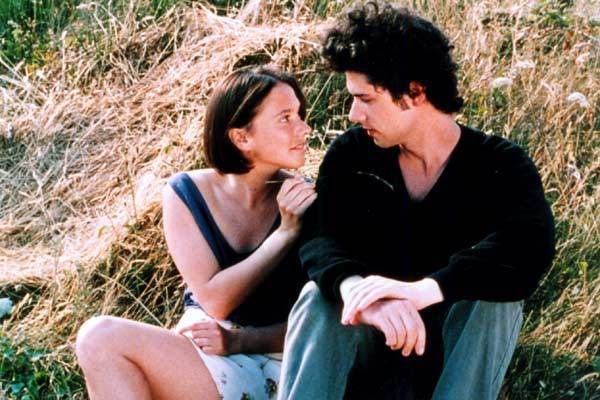Inside, the cinema wasn't merely dark, it was gloomy and disheveled. The foyer was tiny, the box office truly poky. But the films!
One of the projects of this blog has been to write about the films of Eric Rohmer, which over the past 20 years, have given me more pleasure than the work of any other director. I recently started on the Tales of the Four Seasons, though I have seen these films in the cinema.
A Summer's Tale is the story of Gaspard, a young man on holiday at the beach in Brittany. His girlfriend Lena has more or less blown him off; she is on holiday elsewhere and without explanation, delays her arrival. So Gaspard walks the wide empty beaches, or sits at home practicing his guitar and writing songs. At a cafe, Gaspard meets Margot, a pretty, slightly boyish waitress who more or less takes him under her wing.

But Gaspard remains diffident. Lena finally arrives, and proves to be real ball-breaker, but in the meantime Gaspard has become interested in Solene, a willowy teenager looking for some holiday action. As Gaspard bounces between Lena and Solene it is Margot who remains constant. But even she has an alibi of sorts, a reason not to become involved. Margot's boyfriend is in the Pacific, an anthopologist who frequently abroad. One gets the feeling though that were Gaspard to make a decision Margot would not be disappointed.
But Gaspard dithers, and doubts and delays. But all too soon summer's lease must expire and the holidays end. Indeed the ending of the film is as finely balanced in its sweet sadness as any of Rohmer's movies. It's not the neatly folded ending of My Girlfriend's Boyfriend. Here is a brief, piercing moment about the missed oppotunities, perhaps that sadness lies more in the things we don't do than in the things we do. Life is all about Gaspard and he, watching it spin and turn, loses the things most worth catching.
Of course Gaspard has the usual litany of reasons for his evasiveness: some to do with commitment, some to do with a lack of belief in others. Rohmers delicately holds these notions up to the cool Brittany sunlight and finds them terrribly wanting.
A Summer's Tale is full of typically rapid exchanges (thank god for subtitles) as Gaspard and his girls walk the wide beaches at low tide. Many of these scenes were shot drawing a camera on a large trolley (or 'dolly' as I believe film-folk like to call them), some of the scenes stretching over hundreds of metres at a time. The space allows scenes to play out with minimal editing and is one reason why the performances achieve such naturalness. (Another is the delightful Amanda Langlet, who brought the magic to Pauline a la plage.)
There is some improvisation in the dialogue. Rohmer's ability to match his methods with his means was one of his great strengths. There appears to be so little artifice in his films. Very little lighting; almost never any music in post-production, and actors like Langlet who seemed to do their best work in his films. It amazes me that the young heroines of his films didn't all go on to great careers.
Rohmer made his own kind of film. You see the influence in films like The Summer Hours and even a little in The French Kissers. (Although he would surely disdain the gross-out aspects of the boys.) He is even referred to directly in I've Loved Yo So Long. But none of this quite equals the calm, watchful, steady gaze of Rohmer's camera. Or the exquisite, understated comedy. Or the tenderness of emotion that his seemingly endless gallery of young actors brought to the screen.
Eric Rohmer died on 11 January, 2010, aged 89.
Of course Gaspard has the usual litany of reasons for his evasiveness: some to do with commitment, some to do with a lack of belief in others. Rohmers delicately holds these notions up to the cool Brittany sunlight and finds them terrribly wanting.
A Summer's Tale is full of typically rapid exchanges (thank god for subtitles) as Gaspard and his girls walk the wide beaches at low tide. Many of these scenes were shot drawing a camera on a large trolley (or 'dolly' as I believe film-folk like to call them), some of the scenes stretching over hundreds of metres at a time. The space allows scenes to play out with minimal editing and is one reason why the performances achieve such naturalness. (Another is the delightful Amanda Langlet, who brought the magic to Pauline a la plage.)
There is some improvisation in the dialogue. Rohmer's ability to match his methods with his means was one of his great strengths. There appears to be so little artifice in his films. Very little lighting; almost never any music in post-production, and actors like Langlet who seemed to do their best work in his films. It amazes me that the young heroines of his films didn't all go on to great careers.
Rohmer made his own kind of film. You see the influence in films like The Summer Hours and even a little in The French Kissers. (Although he would surely disdain the gross-out aspects of the boys.) He is even referred to directly in I've Loved Yo So Long. But none of this quite equals the calm, watchful, steady gaze of Rohmer's camera. Or the exquisite, understated comedy. Or the tenderness of emotion that his seemingly endless gallery of young actors brought to the screen.
Eric Rohmer died on 11 January, 2010, aged 89.




